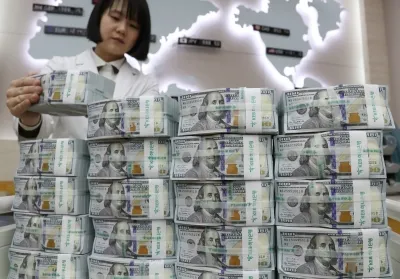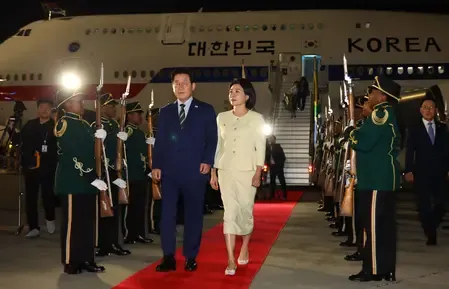Seoul Stocks Plunge to 17-Month Low Amid Trump Tariffs; Won Drops to 16-Year Low

Synopsis
Key Takeaways
- South Korean stocks fell nearly 2 percent.
- Trump's tariffs raise trade war fears.
- KOSPI hits a 17-month low at 2,293.70.
- Foreign investors sold 1.01 trillion won in stocks.
- Local currency at its lowest since March 2009.
Seoul, April 9 (NationPress) South Korean equities dropped by almost 2 percent, hitting a 17-month low on Wednesday, as the tariffs imposed by the Donald Trump administration raised concerns about a worsening trade conflict between the United States and China. The national currency experienced a significant decline against the US dollar.
The key Korea Composite Stock Price Index (KOSPI) decreased by 40.53 points, or 1.74 percent, finishing at 2,293.70. This represents the lowest closing level since October 31, 2023, when it ended at 2,277.99, according to reports from Yonhap news agency.
Trading activity was moderate with 692.55 million shares exchanged, totaling 9.17 trillion won ($6.18 billion), as decliners outnumbered advancers 758 to 145.
Foreign investors and institutional sellers offloaded a combined 1.01 trillion won and 70.42 billion won in stocks, while individual investors bought a net of 939.56 billion won.
The U.S.'s reciprocal tariffs, which include a 25 percent duty on South Korean products, took effect earlier today, following a minimum 10 percent baseline tariff that was implemented on Saturday.
Trump also indicated the possibility of an additional 50 percent tariff on China should Beijing not retract its retaliatory 34 percent tariffs against the U.S., intensifying fears of an escalating trade conflict between the world's two largest economies and its repercussions on South Korea's trade-reliant economy.
"The index may decline further as we anticipate strong retaliatory measures from China," stated Park Hee-chan, a researcher at Mirae Asset Securities. The losses were pervasive.
Major player Samsung Electronics fell by 0.93 percent to 53,000 won, while its competitor SK hynix plummeted 2.65 percent to 165,000 won.
Leading biotechnology firm Samsung Biologics decreased by 1.2 percent to 992,000 won, and Celltrion saw a sharp decline of 5.27 percent to 154,500 won.
Notable battery manufacturer LG Energy Solution dropped 1.26 percent to 314,000 won, while POSCO Holdings, the top steelmaker, fell 0.8 percent to 249,500 won.
Leading automaker Hyundai Motor declined 0.67 percent to 178,000 won, with its affiliate Kia also falling 0.59 percent to 83,800 won.
Major defence contractor Hanwha Aerospace lost 1.0 percent to 691,000 won, while top internet portal Naver decreased 1.5 percent to 176,900 won.
The local currency was quoted at 1,484.1 won against the dollar at 3:30 p.m., a drop of 10.9 won from the previous trading session, marking its lowest value since March 2009.
Bond prices, which move inversely to yields, concluded lower. The yield on three-year government bonds rose by 2.1 basis points to 2.434 percent, while the yield on five-year government bonds increased by 3.2 basis points to close at 2.540 percent.








